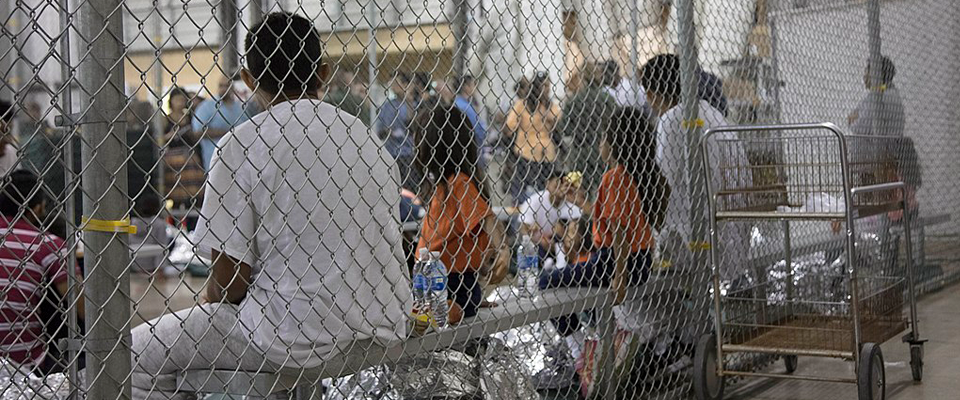Even Before the novel coronavirus struck, an urgent race was on to get migrants out of America’s overcrowded detention centers, where they were already at risk of abuse, malnutrition, a lack of medical resources, and insufficient access to legal services. Now, with the highly contagious COVID-19 pandemic seeping into every fold of American society: “They’re sitting ducks,” says Mattie Armstrong, a second-year Berkeley Law student helping lead Cal’s pro-bono contribution to a project that files bond and parole requests for detained migrants. “Everyone’s basically seeing it as a foregone conclusion that COVID it is going to start to infect people who are in these detention centers, and it will spread very quickly, and people are going to start to die.”
While a typical parole request is a highly individualized process that can take weeks to complete, the law students streamlined it down to a few days.
The coronavirus has fueled a broader push to get non-violent inmates out of prisons around the country. Inmates—crowded into facilities where bathrooms, dining halls, and sleeping quarters are often shared—are at particularly high risk. Already, hundreds of inmates and staff have tested positive at New York’s Rikers Island jail complex alone. “Our jails are petri dishes,” Toni Preckwinkle, president of the Cook County Board of Commissioners, told the New York Times. Ross MacDonald, the Chief Physician of Rikers, recently tweeted, “We expect that 20 [percent] of those infected will need our overburdened hospitals and 5 [percent] will need ventilators that many other citizens will also need.” This reality has led to federal and state efforts to release inmates on a large scale. But the same kind of action has been lagging in migrant detention facilities, which face equally high risks—so far, at least 14 migrant detainees across nine ICE facilities have tested positive—but also often house families, asylum seekers, and individuals who have committed no crimes, violent or otherwise.
This is where the project, called BorderX, comes in. It is run through Innovation Law Lab, a not-for-profit organization that seeks to scale up collaborative legal representation to detained migrants through digital record keeping. As the coronavirus spreads and detention facilities move to halt visitation, access to attorneys becomes even more constrained, and projects like BorderX are increasingly critical.
BorderX is one of five immigration-focused, pro-bono projects led by Berkeley Law students like Armstrong. Unlike others, the project ramped up in the face of the coronavirus, when the pandemic prevented 70 law students from embarking on planned, pro-bono service trips taking place around the country during their spring break. The BorderX model was intended for remote legal services, and Armstrong and her colleagues Joya Manjur and Thomas Horn, first-year law students, managed to recruit more than a dozen of their peers into the project after their other pro-bono trips were canceled. In one day, the students were trained, and in one week, they filed a first wave of more than 50 humanitarian parole requests, an unprecedented number for such a short period of time.
While a typical parole request is a highly individualized process that can take weeks to complete, the law students streamlined it down to a few days, work that included finding and speaking with the migrants’ sponsors, tracking down personal and medical documents, translating everything, and filing the requests. The applications weren’t as robust as usual, but there was a more urgent aim: “to try and flood the system and get as many people out as quickly as possible,” says Manjur.
ICE is known for changing its own rules, often without notice, and for dragging its feet in the face of humanitarian crises.
Their concerns are well-founded. Despite multiple federal judge orders in late-March, including one urging ICE to release migrants held in family detention centers, ICE has made precious little progress. On April 4, ICE announced that five migrants being held in Pennsylvania tested positive for COVID-19. That same day, the Guardian reported that 44 detainees in Louisiana were quarantined after possible exposure to the coronavirus, and that conditions were so bad that some migrants were seeking voluntary deportation in a last-ditch bid to get released. At Adelanto detention facility in Southern California, detainees are sick and unable to get coronavirus tests, where up to 110 men share a room. Meanwhile, detainees in New Jersey began a hunger strike amid a coronavirus outbreak, protesting the lack of basic hygienic products like toilet paper, soap, and sanitizer. Guards reportedly responded by threatening them with tear gas and air soft guns before the detention center went on a mandatory 14-day lockdown. As ICE stalls, U.S. District Judge John E. Jones III has said it would be “unconscionable and possibly barbaric” to not take action. “If we are to remain the civilized society we hold ourselves out to be, it would be heartless and inhumane not to recognize Petitioners’ plight.”
On April 7, Amnesty International issued a report calling on the Trump administration to release immigration detainees. “ICE’s unnecessary detention of tens of thousands of people poses a massive threat to public health. Detaining anyone solely for migration-related reasons during a global pandemic is cruel, reckless and deadly,” the report stated.
Immigration and Customs Enforcement is known for changing its own rules, often without notice, and for dragging its feet in the face of humanitarian crises, so the blanket requests also served a separate purpose: to put ICE on notice. “These were formal requests signed off by lawyers with proof that there was someone to receive them,” says Armstrong. If ICE chooses not to act, she says, “We are forcing ICE to say, ‘Nope, we’re not going to let them out.’ And I think that’s an important thing, because they should be held accountable for whatever happens.”
The long history of inadequate medical care in ICE detention centers doesn’t give the law students hope that ICE will be willing or able to properly care for those who do fall sick. As P.J. Podesta, the advocacy coordinator for Innovation Law Lab, notes, “If New York City doesn’t have enough ventilators, do you think El Paso Service Processing Center has enough?”
“It’s part of a bigger movement,” says Armstrong. “A collective push to do everything they can to get people out.”
As of Wednesday, ICE has granted at least four individuals parole in the law students’ first round of cases. Among the people they’re hoping to get released are several with pre-existing conditions who are not receiving medical treatment or being given needed medication. Recently, a BorderX volunteer worked to get a pregnant woman released. ICE agreed to parole her, but with a $10,000 bond, a sum Podesta characterizes as “a ransom for someone who’s seeking asylum.”
In the interest of speed, Majur says, they had been working to file the requests quicker than normal “at the expense of not including all of the documents we would normally include.” That was done, in part, says Podesta, because they didn’t know how quickly the virus would hit. The message they sent to ICE was this: “If you’re delaying releasing this person at all, you’re risking their lives and the lives of the public, because people detained are not hermetically sealed.” Now, they’re bulking up each request as fast as they can, to retrieve any missing documents. “We’re trying to do as much as possible for as many folks as possible,” says Podesta.
COVID-19 has had the effect of rallying the troops. “It’s part of a bigger movement right now [among] immigration practitioners … a collective push to do everything they can to get people out,” says Armstrong. “They’ve turned their attention to this goal now because there’s this impending situation that is going to be horrendous.”




















